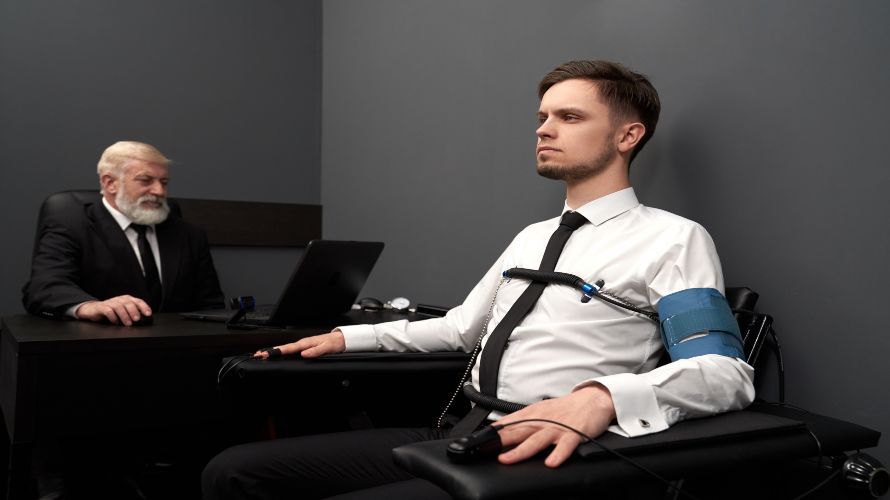As a criminal defence lawyer, I’m often bombarded with similar questions from different clients: ‘Why do the police want to talk to me?’, ‘Am I in trouble?’, ‘Can they arrest me?’, ‘Can they ask me for a lie detector test?’ ‘Can I refuse to give this test?’. While these questions are both obvious and valid, my advice is simple: if the police want to speak to you, contact a criminal lawyer first.
People often lose their calm and reason when police ask them to take a polygraph. While the results of these tests aren’t admissible in court, anything you say to police during their cross-examination can be used against you. It’s important to remember that while the police have a right to search, interrogate and detain potential suspects and witnesses, you also have the right to remain silent, as stated in the Canadian Charter of Rights and Freedoms [section 7 and 11(c)]. If you’re ever asked to take a polygraph test by police, don’t refuse or agree immediately. Know the different aspects of polygraph testing, understand your legal rights and take proper action only after consulting an experienced criminal defence lawyer.
What Is a Polygraph Test and How Does It Work?

A polygraph test – more commonly referred to as a lie detector test – is usually administered to assess an individual’s credibility. The process involves a polygraph, deceptograph, voice stress analyzer, psychological stress evaluator or any other similar device (both mechanical and electrical). The polygraph records physical changes (among them, breathing rate, pulse, blood pressure and perspiration) during an interrogation; the tester reads and interprets those changes.
The test is based on the assumption that people who lie will be nervous (and show typical physical and physiological behaviours), while truthful people won’t. However, this isn’t always the case since nervousness and anxiety are not confined to the guilty. A criminal may be able to lie without flinching, whereas an innocent person may feel anxious about being interrogated by police. What the tester saw or assumed might not be what actually happened.
So, lie detector tests don’t measure deception directly but provide possible signs that a suspect could be lying to interrogators. The result is then used along with other evidence to form a clearer picture of a suspect’s guilt or innocence.
Are the Results Admissible in Court?
Whether you pass or fail, the results of a lie detector test aren’t admissible as evidence in a court of law. It’s natural for an innocent person to think that agreeing to and passing a polygraph test will acquit them of all charges. Unfortunately, that’s not the case.
Firstly, the court believes that the results of a lie detector test aren’t reliable enough to decide a person’s guilt or innocence. Secondly, the test is an impeachment of many rules of evidence – the rule against oath helping, the rule prohibiting the use of prior-consistent statements and the rule against bolstering character.
Can Any Statement Made During the Test Be Used Against You?
Although the results of the polygraph are inadmissible in court, any statement made during the interrogation process are. That includes whether it’s a violent crime such as murder, assault, arson, robbery or dangerous driving, or a non-violent crime like fraud or theft.
Whether the statement comes during the pre-test interrogation or post-test interview, everything is intended to gather enough evidence so the police can pursue their investigation. Even accused persons who believe they may be able to prove themselves innocent through exculpatory statements may unknowingly provide facts and statements that work against them. This is because the more people talk, the more likely it is for their statements to appear to police to be incorrect, exaggerated or unreliable. These unavoidable flaws and errors are often misused during trial cross-examination. Providing any sort of statement makes it easier for the examiner to craft skilful charges and cross-references that may contradict the accused’s point of view.
Fortunately, it’s legal in Canada for you to refuse to partake in a police investigation, and this refusal can’t serve as testament to your guilt. Silence is not proof and can’t be cross-examined. It’s strongly recommended that you speak to an experienced criminal lawyer before making any statement to police or other investigating agency.
When and Why Can the Police Ask for a Polygraph?
Although police can ask you to take a lie detector test at any time, they usually do it at the beginning of an investigation. This is when they are working on evidence collection and developing a theory of the case. And they don’t even need a criminal charge to make such a request. For that matter, you don’t have to be a ‘suspect’ in order to take a polygraph.
So, why would the police waste their time and money conducting lie detector tests on people they don’t suspect? Simply put, when an individual is asked to take such a test, they are certainly a suspect, even if officials insist that they aren’t. In fact, it’s common for police to lack strong grounds to arrest someone until they take a polygraph.
Words of Advice
If you refuse a polygraph, the police may think you have something to hide. If you say yes and fail, you may become their prime suspect. If you agree and pass, they may either let you go or ask you for more information, and their investigation continues. The test is more of a scare tactic to try to extract information from you. Although polygraph test results aren’t admissible in court, they’re still used by police because of their psychological value. So, if you know you’re innocent (or even if you aren’t), avoid trying to convince the police of your innocence. This may incur more risk, with little to no benefit to you.

